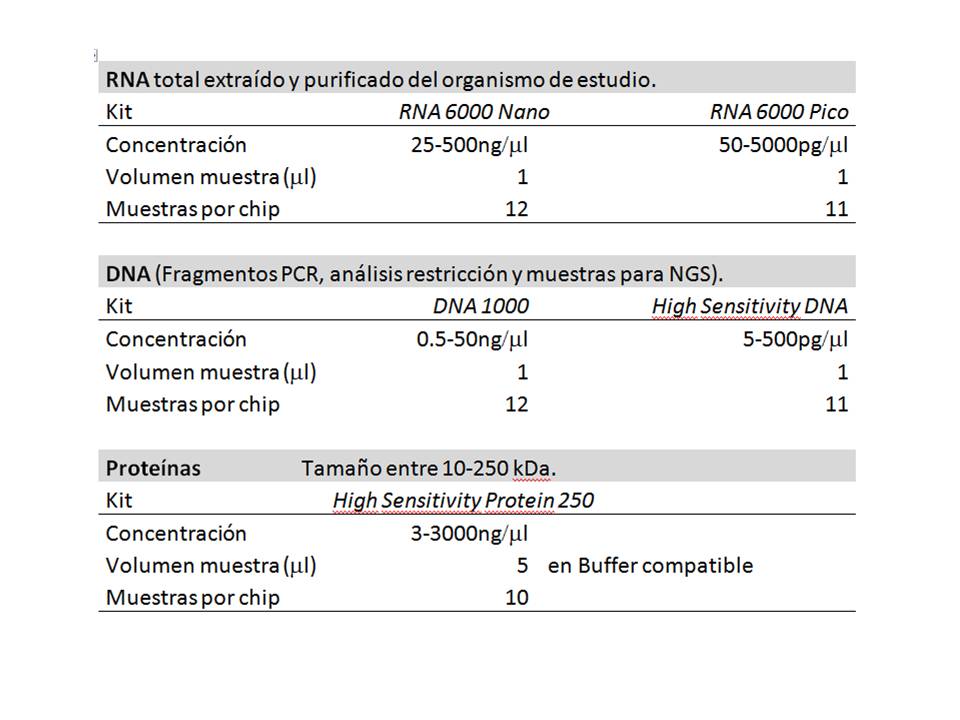The Service provides IBMCP researchers, other public research organizations or private companies with different services in the area of genomics.
Fundamentally, it performs DNA microarray analyses that allows determining the gene expression profiles of the main species of plants and other organisms of interest using the Agilent Technologies technological platform (http://www.agilent.com/home). The commercial arrays of model organisms such as Arabidopsis thaliana, Nicotiana tabacum and Medicago truncatula stand out, as well as those of agronomic interest Triticum aestivum< /em> (wheat), Oryza sativa (rice), Zea mays (maize), Solanum lycopersicum (tomato), Brassica napus (turnip),Gossypium hirsutum (cotton) and Hordeum vulgar (Barley). In addition to gene expression (GE) microarrays, the service also has the possibility of performing CGH, CGH+SNP, ChIp-on-chip and miRNAs microarrays.
Microarray processing includes advice on experimental design, integrity analysis, RNA labeling and hybridization, and microarray scanning, as well as statistical treatment of the data obtained if the user so requires. accurate.
The most efficient experimental design depends on the number of conditions to be compared, the number of replicates needed (minimum 3 to perform the statistical tests) and the technology used. Currently, technological development allows One and two-color experiments to be carried out. In the latter, the samples to be compared are hybridized in the same crystal after being labeled with two different fluorophores (Cy3 and Cy5 cyanines) in such a way that a competition for the crystal probes is established. The quantification of the fluorescence intensities allows the direct analysis of the differential expression of each one of the probes, after the previous processes of normalization and statistical study. In the One-color experiments, this comparative analysis is carried out virtually from the fluorescence intensities obtained when the crystals are hybridized separately with each of the samples marked with a single fluorophore, thus expanding the possibilities of the study.</ p>
The service also has a robotic system (MicroGrid II) that allows printing microarrays of oligonucleotide collections or PCR products provided by the user . In this case, the design and printing of the crystals are included to the microarray processing services.
The service also offers sample analysis using nanocapillary electrophoresis (Agilent’s Bioanalyzer 2100). The analysis makes it possible to quantify and know the integrity of nucleic acid samples (RNA and DNA) as a quality prerequisite for their use in other experiments, to carry out DNA genotyping and to monitor the purification processes of strong>proteins precisely.
Lastly, the IBMCP has set up a new recombinant protein production service in E. coli. Bacterial systems for the expression of heterologous proteins have important advantages in terms of ease of use, cost and production times.
The service starts from the organism transformed with the recombinant protein tagged with His/MBP/GST. You will perform small-scale expression assays to design the protocol with the parameters optimized for the specific protein. More information in the following PDF:
In the future, the possibility of producing recombinant proteins in eukaryotic systems (P. pastoris or S. cerevisiae) is considered, since it allows the expression of proteins with post-translational modifications.
Administrative procedure:
External Users
Internal Users
Sample requirements:
microarrays
Total RNA samples extracted and purified from the study organism with a minimum concentration of 100 ng/ul. Minimum volume of 5 ul.
Integrity will be checked in the Agilent Technologies Bioanalyzer 2100, requiring a minimum RIN (RNA Integration number) of 7-6.5 to perform the experiment.
Quality analysis with the Bioanalyzer 2100
In all cases, the Order Sheet will be filled out.

Responsable of the service